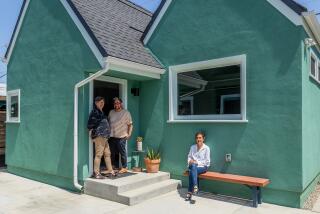Carrin Wants to Share Her Home, but Roommate Must Be Someone Special
The breakfast Carrin Alba prepared was simple--scrambled eggs and orange juice--but made, like most everything the 27-year-old Cerritos College student does, with great care.
The table was set with place mats, matching napkins and silverware, and in the early morning sunlight her small kitchen looked immaculate.
Every weekday morning before school, Carrin gets up at 8 to feed her two cats, Blackie and Shadow, and to clean the tidy four-bedroom house in Norwalk that she shares with a roommate.
It’s a cozy house with a small backyard, within walking distance of the college. But since Carrin moved in three years ago, two of the bedrooms have been empty, and she wonders whether she will ever find roommates to occupy them.
The problem is that she is looking for a special type of roommate.
“I’d like someone who cleans up after themselves and will help out with chores,” she said. “I’d like to find someone in their 20s. Someone I can go out to a show with sometime and do things with.”
“I want to find someone like me,” said Carrin, who has Down’s syndrome, a genetic birth defect that causes physical and mental retardation. Her current roommate is also retarded.
Like most college students, Carrin has found moving from home to be financially difficult, but only to a point. Out of the $560 she receives each month in Social Security benefits, she must put aside $250 for rent. But she has an understanding landlord--her mother owns the house.
Still, she says she enjoys the freedom that she has.
“I love living on my own,” she said between sips of juice. “My mom was bossing me around, and I was a baby sister, so my sisters bossed me around, too. I needed to get out of there.”
Carrin talked about family squabbles for a few minutes while clearing the table and washing the dishes. Then she offered a quick tour of her home.
In the living room, Billy Joel and Beatles albums were filed neatly on a shelf next to a couple of romance novels with tattered covers.
“My favorite books,” she said sheepishly.
A Scott Baio fan, Carrin has covered her bedroom walls with photographs of the actor. She says she rarely leaves home without wearing her “I Love Scott Baio” button.
“This room has a fireplace and plenty of light,” Carrin said as she entered one of the empty bedrooms. “It’s one of my favorite rooms. This is a nice place to live.”
With the help of the Harbor Regional Center in Torrance, a nonprofit agency that serves mentally retarded children and adults, Carrin and her mother, Candy Kimble, have been searching for other developmentally disabled adults who can live on their own.
“I just can’t believe there is no one else out there like Carrin,” her mother said.
Of 4,000 clients served by the center, about 1,000 are adults living at home with their families or in apartment buildings run by the center’s independent living program, said Marilyn De Shields, a program manager at the center.
Although a counselor from the center visits them at least twice a week, Carrin and her roommate are the only clients living in their own home, De Shields said.
“A lot of our clients are not capable of living independently,” De Shields said. “Living independently in a home is a relatively new concept around the country. Carrin comes from a remarkable family. They are definitely ahead of their time with this.”
De Shields said most families prefer their disabled children to live at home rather than be institutionalized. But many are reluctant to have their children move out.
“The problem is fear,” De Shields said. “To allow your son or daughter to live in a home like Carrin’s--that’s a real jump. . . . It takes a lot of courage to do what Candy Kimble did.”
But Kimble says her decision was prompted by a fear that many parents harbor.
“Some people think I push her too hard. But what is she going to do when I’m not around anymore to help her?” Kimble asked. “That’s what I am worried about. She needs to be independent.”
Carrin, who is at ease with her life style, says she “can’t understand what the big deal is.” She rides her bicycle to special classes at the college four days a week and carries her books in a backpack like many other students.
“People sometimes look at me funny when I tell them I have my own place,” she said. “They expect me to live with Mommy and Daddy still. But I’m not a baby. I can take care of myself. Sometimes people think I’m dumb, too. But I’m not. I’m real smart.”


